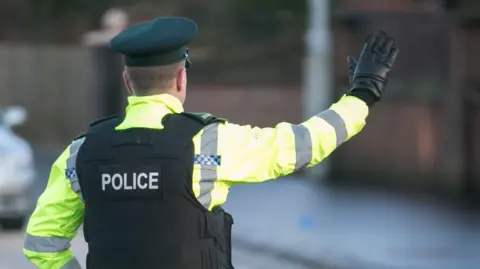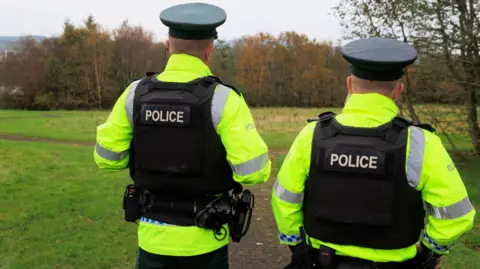NI police 'need support to deal with lasting trauma'
 PA Media
PA MediaA former police officer has spoken about the lasting trauma of attending tragic incidents, saying many officers have experiences that stay with them "forever".
Linzi McLaren was speaking as new statistics show that more than 60% of police officers in Northern Ireland, who took long-term sick leave in the past year, cited mental health reasons.
Figures obtained from the Police Service of Northern Ireland (PSNI) via a Freedom of Information request, have also revealed that the number of officers who have taken leave over anxiety, depression and PTSD has risen in the past five years.
The Police Federation of Northern Ireland said colleagues were "suffering" because of a lack of resources.
'I can see him on the back seat'
Ms McLaren, a councillor who served in the PSNI for 18 years, said most officers "all have one or two incidents that they will remember forever".
"I remember attending a suicide 20 years ago. Even now, driving home at night in the dark, if I'm in the car on my own and I look through the rear-view mirror, I can see him on the back seat," she said.
"I remember one colleague who worked with the murder team for 30 years, and it never fazed him, every time he went to a scene no matter how graphic.
"It was only when his own children became the ages of those victims that all of a sudden it had a huge impact on him."
Ms McLaren said mental health had always been a major problem within the service, but attitudes towards support have only recently changed.
"In days gone by, especially during the Troubles, you didn't go off sick with mental health," she said.
"You maybe got a day [off] and your mates got you a bottle of whiskey."
 PA Media
PA MediaMs McLaren said some colleagues have held back on admitting the extent of their struggles for fear of how it would affect their career.
How many more officers are taking mental health leave?
The PSNI defines long-term absence as officers who have been absent from work for 29 days or more, in one period.
More than 1,700 officers took such an absence in 2024-25, more than 27% of the total police workforce.
Of that number, 1,032 are on psychological sick leave.
There has been a notable increase in the number of officers who took at least one day off work due to various mental health reasons.
- 163 officers took at least one day off work for anxiety in 2021-22 - the number was 264 in 2024-25
- 40 officers took at least one day off work for depression in 2021-22 - that number was 52 in 2024-25
- 65 officers took at least one day off work for PTSD in 2021-22 - but by 2024-25 it was 102
The number of officers who have left the PSNI directly after taking psychological sick leave has also risen.
Figures also show that 218 officers left the organisation after a period of psychological sick leave in the latest financial year, compared to 74 in 2021-22.
Ms McLaren said that these days PSNI officers were more willing to engage in discussions around mental health, but occupational health services were not able to keep up with demand.
"Our occupational health is not an emergency service, and they remind us of that all the time," she said.
"They [officers] have nightmares, they can't sleep, they've got anxiety or depression – and they go to occupational health services but maybe can't get an appointment for six months."
'No real understanding of the trauma'
Ms McLaren said more and more people were turning to private health care, but some felt it was not a sufficient option for them because the experience of dealing with various forms of trauma while working as an officer is so unique.
"You are also tied to data protection, so you can't go and discuss the murder or suicide you just attended," she added.
"You can't go home and discuss it with your partner or your children.
"So there really is no other avenue or outlet to talk about what you've witnessed, apart from your colleagues."
Early counselling is something Ms McLaren has been calling for.
"For those officers that attend traumatic incidents, give them counselling at that time in a bid to stop them from deteriorating to the point that they can no longer work," she explained.
 PA Media
PA MediaThe chair of the Police Federation of Northern Ireland, Liam Kelly, said the latest figures were "not in the least bit surprising".
"[Officers] are doing more with less and without adequate resources from the devolved executive, these pressures will inevitably intensify," he said.
"Colleagues with a number of conditions - some complex and long-term - are suffering because of both a lack of resources and a limited cadre of overburdened professionals capable of supporting and assisting them.
"The situation is immensely challenging and this federation has been voicing serious concern at the lack of tangible and speedy progress."
Clare Duffield, the PSNI's assistant chief officer for people and organisational development, said: "The rise in employee absence for mental health reasons is an issue affecting many employers and sectors.
"The Police Service of Northern Ireland is no exception to this."
She added the PSNI recognised that officers faced "considerable and unique challenges" in their careers and the organisation was "committed to continuously improving the range of health and wellbeing services and support" it offers.
